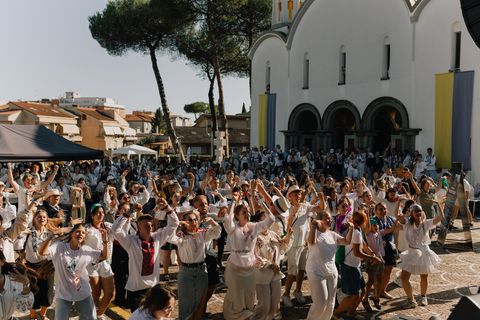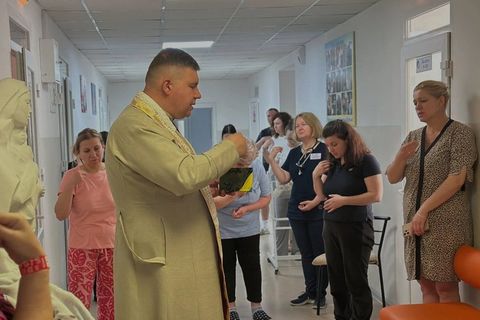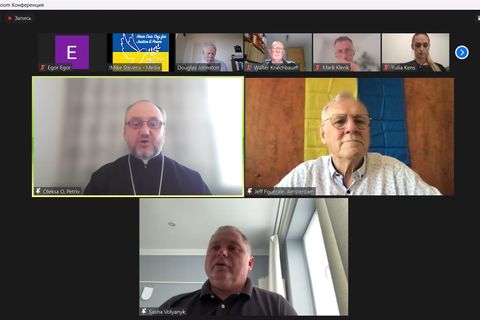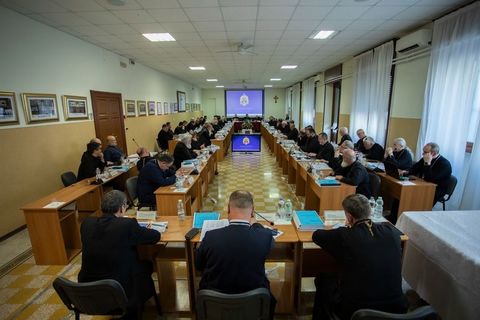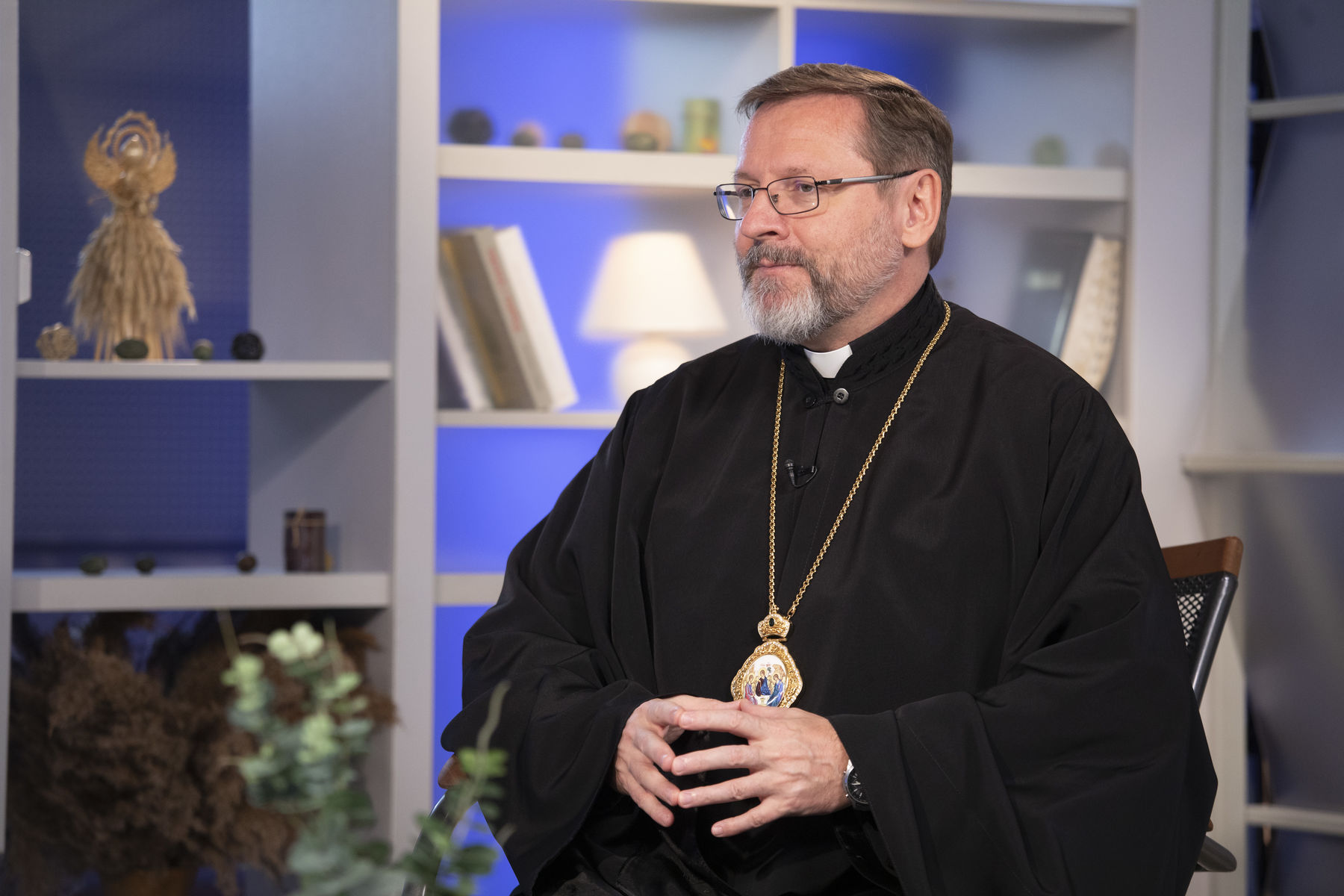
Six thoughts of His Beatitude Sviatoslav about healing the wounds of war in Ukraine
How can a Christian help a person who has suffered a disaster from war, how take care of children at this time, and talk about war while staying abroad? We bring to your attention the thoughts of His Beatitude Sviatoslav about the wounds caused by the war and healing from them.
1. The Word of God from Ukraine today resonates in the souls of the people worldwide.
We see how life-giving the word of the Church is in war conditions. It gives strength and hope. I remember how I visited the mayor Vitaliy Klitschko when Kyiv was under siege. He then said that we needed a word of hope more than bread. It just reminded us that even in times of war, the Church cannot be limited to another humanitarian mission. Many other organizations do this. Of course, the Church serves the needy, but at the same time, it is the bearer of the word and eternal life that our Savior gave us. During the war, many people found God and came to Baptism. Every Sunday, every day, they want to hear God’s word. Our task is to preach, to make disciples of all nations. And we see how God’s word from Ukraine today resonates in the souls of the people worldwide.
2. We should be close to those who cry and accompany them. We should even mourn with them.
How can wounds be healed? To completely heal everything, you need to return the lost person. We cannot do that today. But even when we pray for the deceased or bury the dead, we do it by singing of Easter hymn of our faith in the resurrection. In this moment of pain, we begin to preach that even a tragically deceased person continues to live. He exists. Moreover, the Church preaches the possibility of resurrection and meeting with this person. And even “The Eternal memory” which we sing over the bodies of our deceased is a hymn of praise to God’s memory of us. Human memory is not eternal. Someone will say: “I will always remember.” It is not true. Only Lord is eternal. He remembers our pain, our grief. We pass our dearest ones into His paternal arms. This is what, at the first stage, allows us to survive a terrible event. And from the pastoral side, I think that the vocation of the Church is to be there! Even in those moments when we sing: “Let all human flesh be silent,” we should be there, accompany those who cry. We have the right to mourn with them.
3. To save a person, you cannot leave him alone in his pain.
Soldiers must find themselves even after being wounded. Life is not over. You have to learn to keep going. Perhaps you should discover your own body in a new way and see the prospects of your life. You can and should continue to live. It is obvious that when it comes to qualified medical care — the Church can only be a contributing factor. I am happy when we can help our hospitals with medical equipment, medication, or additional transport. Apart from that, the network of Church communities helps with the further rehabilitation of our soldiers, specifically with prosthetic treatment. Victims of violence, including rape or other forms of torture, need special attention, sometimes psychological help. Such a person should be supported, and saved. Suicidal moments occur when a person is abandoned. She feels that no one needs her. Alone with her pain, it seems that it surpasses her, and she cannot cope with it. All people who have experienced such terrible moments need support. They need to be surrounded by attention and love of the community. The church is a community. It is not some cold structure. When a warrior, woman, or man is evacuated to another environment, they need to be transferred from one community to another. Then, with their testimony, such people can be the saviors of other people themselves and show how it is possible to overcome all the consequences of physical and mental injuries.
4. It is significant for children to go to school.
No one can replace a child’s father and mother. Therefore, we, as a society and the Church, need to do everything for the child to grow up in a family. We must understand that the family is an eternal, fruitful, inseparable union. It is the unity of man and woman. On the one hand, the family is a necessary environment for a child, where it can fully develop. On the other, such a family is the fundamental cell of society. If we want to speculate on how to build our Ukraine, when we win, when the war ends, we need to think about how to strengthen the family! Predominantly, we need to accompany families when they are going through the journey of an internally displaced person or a refugee. The family is an exceptional oasis of human dignity, but it also needs society. In order for the family to function, it must be integrated into the wider community. That is why our families need reintegration into the social context of the cities, villages and territories where they find themselves. It is significant for children to go to school. On September 1, we start a new school year. We see how our state and educators are starting to work so we can begin face-to-face learning. This is one of the ways to take care of these children, particularly when it comes to the children of our immigrants. It is important that they go to school where they are today. If, due to those circumstances, the children will be out of the school process, we will do them a great harm. I would like to recall that we received a letter of request from the Ministry of Education and Science to, if possible, provide schoolchildren with access to dungeons in our churches and monasteries that can function as certified bomb shelters. We are willing to do so. I invite school principals to visit the nearest Greek Catholic church and see what we have. Social protection of the family is a common effort of both the Church and the State. I assume that in war conditions, the need and, therefore, the prospect of pro-family policy is even more acute.
5. To be the voice of those whose voice is suppressed. To be the voice of the afflicted!
Every Christian is called to bear witness to the truth. This is what the Holy Gospel calls us to do. Do you remember Christ before Pilate? The Savior says, “I have come to bear witness to the truth.” Then Pilate asks: “What is truth?” Then the conversation ceases because, for Christians, the truth is not something but someone. And during the war, the aggressor is crucifying Christ in the body of our people. Again Christ is handed over to torture and death on the cross. In the conditions of war, Pilate’s question: “what is truth?” turns into an ideological and informational war against the victim. In such circumstances, we, as the Church, must bear witness to the truth and speak the truth about what is happening in Ukraine. We must be the voice of those trying to steal their voice. To be the voice of the afflicted!
6. Not to let anyone get used to war!
Sometimes we see that information about the war in Ukraine starts to bore some people. Technically, the war in Ukraine ceases to be news on the front pages of newspapers and magazines, particularly in Western Europe or North America. Our task is to keep up the flow. Raise conscience. Maybe sometimes we must be like the annoying mosquito that keeps us awake. Because when we come to terms with the fact that there is a war and Russians are killing civilians in Ukraine, it will become another tragedy that we have no right to let it happen. It would be an information disaster for modern humanity. And that is why our task is to awaken people’s hearts with the word of truth.
The UGCC Department for Information
